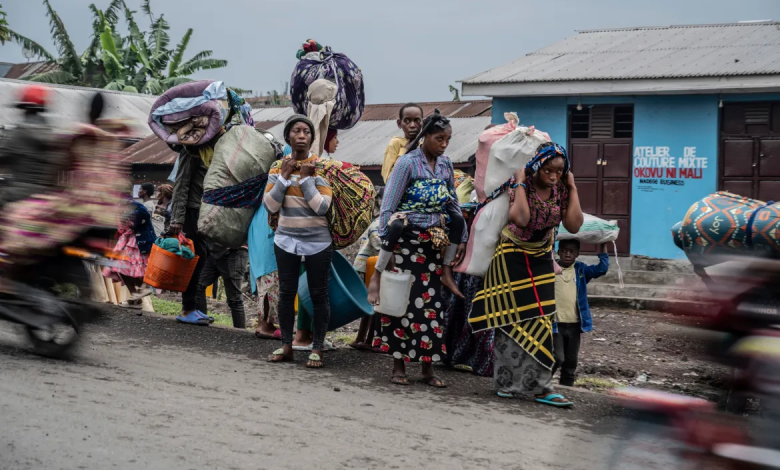Humanitarian Crisis Persists in DR Congo As Calm Returns to Goma
Since the Rwanda-backed M23 rebels occupied Goma town, the sanitary and humanitarian situation has deteriorated.

As calm returns to North Kivu, the provincial capital of Goma in the Democratic Republic of Congo, humanitarian conditions remain critical for thousands of displaced persons living in camps, schools, and churches around the city.
After weeks of fierce fighting between the M23 rebels and the Congolese army, the French humanitarian organisation Medecins Sans Frontieres (MSF) stated on Monday, Feb. 10, that it is on the ground to furnish emergency assistance to the population.
“Certain camps to the north of the city are empty. Others are still full. People have fled towards Goma or have returned to their homes. Many of those remaining don’t know what awaits them in their homes if their houses are still there,” Virginie Napolitano, MSF’s emergency coordinator, said in a statement.
Napolitano added that they are treating victims of sexual violence, distributing food and water, and ensuring sanitary installations. In Goma, several people continue to fetch water from Lake Kivu. However, MSF said it installed chlorine points to disinfect the water and donated chlorine to limit the spread of illnesses such as cholera.
The humanitarian situation in Goma was discussed during the joint Southern African Development Community (SADC) and East African Community (EAC) summit in Dar-es-Salaam, Tanzania on Feb. 8.
Most recommendations adopted during the meeting were not executed 48 hours after convergence. These include a ceasefire and immediate unconditional cessation of hostilities, the supply of humanitarian assistance including the repatriation of dead bodies and evacuation of the wounded; the opening of principal supply routes and so on.
Since the Rwanda-backed M23 rebels occupied Goma town, the sanitary and humanitarian situation has deteriorated. With over 3,000 dead and more than 2,000 injured, calls have been made for the facilitation or the opening of a humanitarian corridor to bring assistance to the people in distress.
The United Nations and other humanitarian organisations are unanimous that the Goma International Airport and other blocked routes which have been inaccessible until now must be opened and resume activities to facilitate the opening of the humanitarian corridor in conformity with the principles of international law.
Humanitarian conditions in Goma, North Kivu, remain dire as thousands of displaced individuals face challenges after recent intense conflict between M23 rebels and the Congolese army.
Medecins Sans Frontieres is providing emergency aid, focusing on treating sexual violence victims, distributing essentials, and ensuring sanitation. Efforts to disinfect water sources in Goma are underway to prevent diseases like cholera.
Despite discussions during the SADC and EAC summit, recommendations such as ceasefire and humanitarian assistance have yet to be implemented. With significant casualties and many injured, there is an urgent call for the establishment of humanitarian corridors.
The UN and others stress the need to open Goma International Airport and blocked routes to facilitate aid delivery according to international law.
Support Our Journalism
There are millions of ordinary people affected by conflict in Africa whose stories are missing in the mainstream media. HumAngle is determined to tell those challenging and under-reported stories, hoping that the people impacted by these conflicts will find the safety and security they deserve.
To ensure that we continue to provide public service coverage, we have a small favour to ask you. We want you to be part of our journalistic endeavour by contributing a token to us.
Your donation will further promote a robust, free, and independent media.
Donate HereStay Closer To The Stories That Matter




